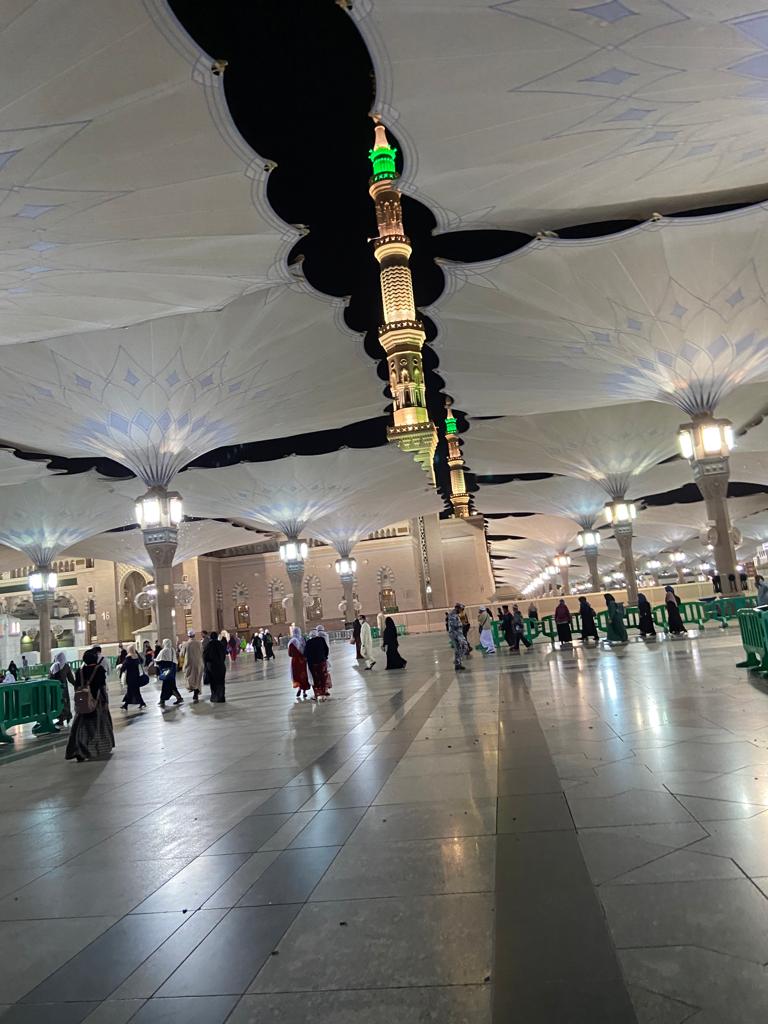The Unmatched Reward of Praying in Masjid an-Nabawi and Its Heavenly Garden
Table of Contents
The Reward of Praying in Masjid an-Nabawi: 1000x Blessings & Paradise’s Garden
The reward of praying in Masjid an-Nabawi is a central spiritual magnet that draws millions of Muslims to Medina each year. For every believer, a visit to the Prophet’s Mosque is more than a pilgrimage; it is an opportunity to harvest divine blessings in a place where worship is magnified beyond compare. This article explores the profound reward of praying in Masjid an-Nabawi, from the unparalleled multiplication of good deeds to the unique status of its heavenly garden, Ar-Rawdah.
The Ultimate Multiplication: A Prayer Worth a Thousand
The most significant aspect of the reward of praying in Masjid an-Nabawi is the extraordinary multiplication of blessings for every act of worship performed within its walls. The Prophet Muhammad (PBUH) clearly defined this virtue:
“A prayer in my mosque is better than a thousand prayers in any other mosque, except Al-Masjid Al-Haram.” (Sahih al-Bukhari & Muslim)
This Hadith, narrated by companions like Abu Hurairah and Ibn Umar (RA), establishes the foundational principle behind the reward of praying in Masjid an-Nabawi. Let’s examine the profound implications:
- For Obligatory and Voluntary Prayers: Islamic scholars clarify that this 1,000-fold multiplication applies to both the five daily obligatory prayers (Fard) and voluntary prayers (Nafl). The general wording of the Hadith encompasses all acts of prayer.
- A Tangible Calculation: To grasp the scale of this blessing, consider that performing the five daily prayers (Fard) in the Prophet’s Mosque yields a reward equivalent to 5,000 prayers elsewhere. As some scholars explain, this single day of worship can equal the reward of years of consistent prayer in a local mosque, making the reward of praying in Masjid an-Nabawi an unparalleled spiritual opportunity.
- The Sacred Hierarchy: This teaching also establishes a hierarchy among mosques. While the reward of praying in Masjid an-Nabawi is 1,000-fold, a prayer in Masjid al-Haram in Mecca is even greater, equivalent to 100,000 prayers elsewhere. This places the Prophet’s Mosque as the second-most sacred and rewarding place of worship on Earth.
Ar-Rawdah: The Crown Jewel of the Mosque’s Reward
Within the mosque lies an area of even more concentrated blessing: Ar-Rawdah Ash-Sharifah (The Noble Garden). The Prophet (PBUH) declared:
“What is between my house and my pulpit is a garden from the gardens of Paradise.” (Sahih al-Bukhari & Muslim)
This statement adds a unique dimension to the reward of praying in Masjid an-Nabawi. Scholars have interpreted this in several profound ways:
- A Conduit of Mercy: Scholars like Ibn Hajar Al-Asqalani explained that this area is a source of divine mercy and spiritual tranquility, where worship directly leads to Paradise.
- A Physical Piece of the Hereafter: Another compelling interpretation is that this specific land will be physically transported to Paradise in the Afterlife, making it a literal garden.
- A Resemblance in Serenity: It also means the area resembles the gardens of Paradise in the peace and spiritual joy it provides to believers.
Maximizing the Reward in Ar-Rawdah
Given its status, it is highly recommended for visitors to pray their voluntary prayers in Ar-Rawdah. The Prophet (PBUH) himself prayed at specific pillars within this area.
Sheikh Ibn Uthaimin advised, “One should seek to pray in Ar-Rawdah if it is easy for him, due to its virtue.”
A Vital Clarification: The 1,000-fold reward of praying in Masjid an-Nabawi applies to the entire mosque. The virtue of Ar-Rawdah—its status as a “garden of Paradise”—is an additional, separate blessing. Therefore, while praying Nafl in Ar-Rawdah is ideal, one should not neglect the superior status of the first rows during congregational prayers for the sake of sitting in Ar-Rawdah.
Balancing Virtues: Home, Rawdah, and Congregation
A nuanced point arises from the interplay of Islamic virtues. While the reward of praying in Masjid an-Nabawi is multiplied, the Prophet (PBUH) also taught that the best place for voluntary prayers is one’s home, to ensure sincerity.
Scholars reconcile this by explaining that while the quantity of reward is greater for Nafl in the mosque, the quality and spiritual perfection of a prayer at home can be higher. However, given the unique status of the Prophet’s Mosque, performing Nafl prayers there is a rare opportunity that visitors are encouraged to seize.
Conclusion: An Eternal Investment
Understanding the reward of praying in Masjid an-Nabawi transforms a visit from a simple tour into a profound spiritual investment. It is a chance to worship where every prostration is magnified a thousandfold and to tread on ground promised to be from Paradise itself. By striving to pray in Ar-Rawdah for voluntary prayers while prioritizing the first rows for congregational prayers, a visitor truly maximizes the unparalleled reward of praying in Masjid an-Nabawi, leaving with a heart full of faith and a record of deeds enriched beyond measure.

